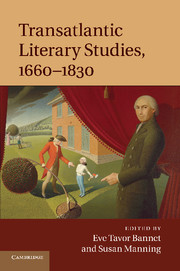Book contents
- Frontmatter
- Contents
- Notes on contributors
- Acknowledgements
- Introduction: British and American genres
- Chapter 1 Transatlantic books and literary culture
- Chapter 2 Transatlantic utopianism and the writing of America
- Chapter 3 Tales of wonder, spiritual autobiographies, and providence tales
- Chapter 4 Life writings
- Chapter 5 Benjamin Franklin and transatlantic literary journalism
- Chapter 6 Theatre, drama, performance
- Chapter 7 Transatlantic American Indians
- Chapter 8 Literature of the ocean
- Chapter 9 “To gird this watery globe”
- Chapter 10 Ghostly and vernacular presences in the black Atlantic
- Chapter 11 Susanna Rowson and the transatlantic captivity narrative
- Chapter 12 Domestic fiction and the reprint trade
- Chapter 13 Transatlantic Gothic
- Chapter 14 Transatlantic Romanticisms
- Chapter 15 Journeys of the imagination in Wheatley and Coleridge
- Chapter 16 Transatlantic historical fiction
- Further reading
- Index
- References
Chapter 3 - Tales of wonder, spiritual autobiographies, and providence tales
Published online by Cambridge University Press: 05 January 2012
- Frontmatter
- Contents
- Notes on contributors
- Acknowledgements
- Introduction: British and American genres
- Chapter 1 Transatlantic books and literary culture
- Chapter 2 Transatlantic utopianism and the writing of America
- Chapter 3 Tales of wonder, spiritual autobiographies, and providence tales
- Chapter 4 Life writings
- Chapter 5 Benjamin Franklin and transatlantic literary journalism
- Chapter 6 Theatre, drama, performance
- Chapter 7 Transatlantic American Indians
- Chapter 8 Literature of the ocean
- Chapter 9 “To gird this watery globe”
- Chapter 10 Ghostly and vernacular presences in the black Atlantic
- Chapter 11 Susanna Rowson and the transatlantic captivity narrative
- Chapter 12 Domestic fiction and the reprint trade
- Chapter 13 Transatlantic Gothic
- Chapter 14 Transatlantic Romanticisms
- Chapter 15 Journeys of the imagination in Wheatley and Coleridge
- Chapter 16 Transatlantic historical fiction
- Further reading
- Index
- References
Summary
Recent scholarship on providence tales, wonder tales, and spiritual autobiographies has revolutionized how we view these genres in relation to the major developments in the literary and cultural histories of the period, demonstrating the inextricable relation between these very genres and those works and authors from the period whom we consider most sophisticated and worthy of study. Lorraine Daston and Katharine Park's Wonders and the Order of Nature (1998), Mary Baine Campbell's Wonder and Science: Imagining Worlds in Early Modern Europe (2004), and Barbara M. Benedict's Curiosity: A Cultural History of Inquiry (2001) have all shown the way in which these seemingly “lowbrow” genres were, in fact, integral parts of so-called “highbrow” culture during this period. In addition, each of these works of scholarship has demonstrated how the odd and unusual events presented in providence tales, wonder tales, and spiritual autobiographies played crucial roles in the transformation of the way early moderns experienced the world in which they lived. Such transformations did not sweep away the old as the new emerged, though, for older ways of organizing the world not only remained well into the modern period but, in fact, actively helped shape ways of experiencing the world we now cast as distinctly modern. Julie Crawford's Marvelous Protestantism: Monstrous Births in Post-Reformation England (2005) and Alexandra Walsham's Providence in Early Modern England (1999) each demonstrate the continuing importance of the belief in Godly intervention deep into the so-called era of Enlightenment. The belief in such interventions in shaping the spiritual development of individuals remained as well, as D. Bruce Hindmarsh shows in The Evangelical Conversion Narrative: Spiritual Autobiography in Early Modern England (2005). Hindmarsh reveals the persistence of the spiritual autobiography through the eighteenth century; he also shows that people from different races, genders, classes, and ranks tried their hand at spiritual autobiographies.
- Type
- Chapter
- Information
- Transatlantic Literary Studies, 1660–1830 , pp. 46 - 59Publisher: Cambridge University PressPrint publication year: 2011



